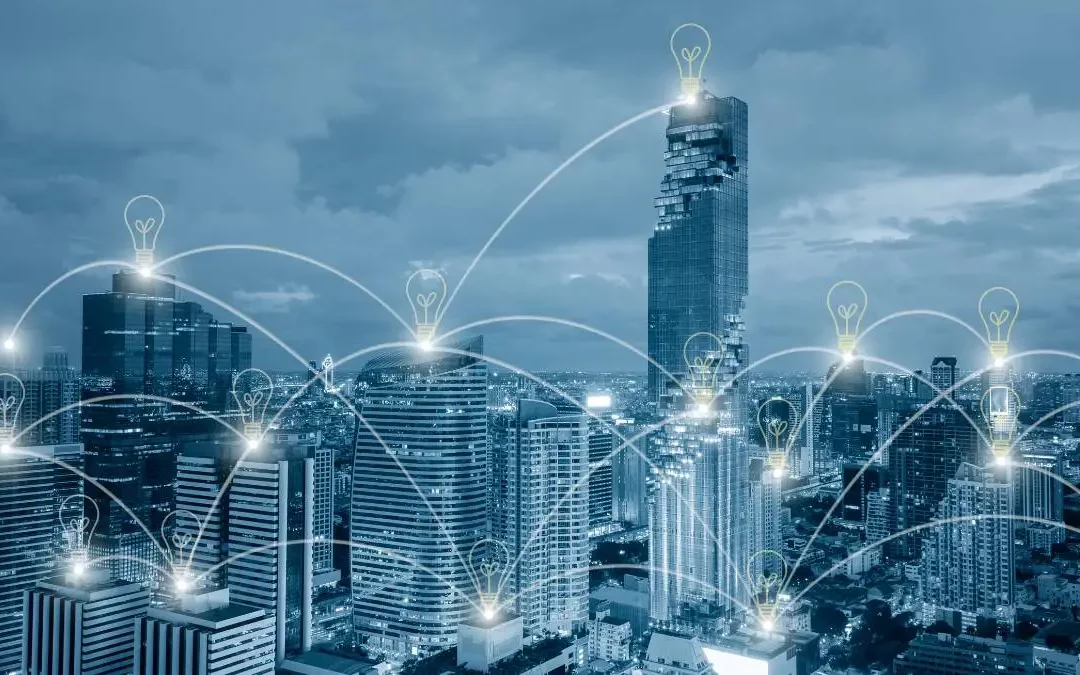AI in Utilities is becoming the beating heart of the Energy & Utilities sector, with transformations that promise to reduce human error, improve operational efficiency and enable new decentralized models.
According to IBM, 74% of companies in the Energy & Utilities sector have already implemented or are exploring AI in utilities solutions within their operations. Confirming the trend, the Gartner Report “CIO and Technology Executive Survey”, predicts that by 2027, 40% of control rooms will be managed by AI-supported operators.
The push for adoption is not only technological but also strategic: 94% of CIOs in the sector intend to increase investments in AI, with an average increase in spending of 38.3%.
“Artificial intelligence is poised to transform the energy and utilities sector,” says Jo-Ann Clynch, senior analyst at Gartner. “Human decision-making remains central, but it is also a major source of error in industrial settings. AI, if well governed, can perform tasks with precision, repeatability and impartiality.”
The sector is progressively moving beyond the traditional model based on centralized assets, thanks to technological advances and growing customer awareness. The transition to distributed energy resources – such as photovoltaic panels and storage systems – paves the way for more dynamic energy ecosystems, where intelligent assets owned by the customer become an integral part of the logic of production, cost optimization and comfort improvement.
In this scenario, explains Clynch, “CIOs must lead the creation of intelligent operations capable of integrating these assets into the company’s digital system. It will be essential to invest in modern infrastructure, analytics and cloud solutions, while at the same time preparing the IT infrastructure for the adoption of AI Utilities within the control rooms”.
AI in Utilities is no longer an option, but a priority. Companies that are able to combine innovation, security and governance will be able to fully reap the benefits of artificial intelligence, paving the way for a more sustainable, resilient and intelligent energy future.
In key sectors such as energy, artificial intelligence facilitates the management of operational flows, improves the experience and optimizes the allocation of resources.
AI IN UTILITIES MARKET TRENDS

According to Markets&Markets, the global AI Utilities market will exceed $58 billion by 2030.
Key technologies in the AI Utilities market include: Computer Vision, Machine Learning, IoT, Generative AI.
AI in Utilities support operators in their sustainability and efficiency goals, supporting optimized resource management, energy demand forecasting, infrastructure asset monitoring, and maintenance interventions.
Intelligent management of energy resources
Artificial intelligence enables advanced and dynamic control of energy resources, promoting more effective integration of renewable sources into the system and ensuring balance between production and consumption. Thanks to advanced algorithms, it is possible to prevent overload situations and increase the reliability of networks.
Advanced Energy Demand Forecasting
AI is able to analyze a huge amount of data in real time – weather, consumption history, usage behaviors – to accurately estimate peaks and dips in energy demand. This allows operators to optimize the entire production and distribution cycle, with important benefits in terms of efficiency and waste reduction.
AI in UTILITIES FOR ASSET MONITORING
One of the most promising uses of AI is the continuous monitoring of infrastructure. Intelligent systems can detect early signs of wear or anomalies in machinery, allowing targeted interventions to be scheduled before failures occur. This approach minimizes machine downtime, contains operating costs and helps maintain high safety standards..
AI Agents in utilities

In the world of Utilities – energy, water, gas, networks and related services – operational efficiency, intelligent data management and fluid interaction with the customer are fundamental elements. In this scenario, the new generation of AI Utilities Agents is establishing itself as a strategic ally: autonomous systems, capable of interacting, learning and acting in real time, with significant impacts on every area of the business.
They are no longer simple chatbots, but intelligent and proactive entities that can improve every phase of the customer journey, simplify internal processes and strengthen operational resilience.
AI IN UTILITIES APPLICATION OVERVIEW
AI in Utilities Customer care
AI agents revolutionize customer care by making it available 24/7, multi-channel and above all proactive. They don’t just answer questions, but anticipate needs by analyzing behaviors and consumption data.
For example, they can independently report abnormal consumption, propose a more suitable tariff plan or manage a service interruption by informing the customer in real time. Thanks to Natural Language Processing (NLP), the conversation takes place in natural language, with the ability to manage complex contexts, recognize emotions and adapt tone and responses.
back office intelligent automation
In internal operations, AI in Utilities agents take on the role of digital workers: they manage data entry, updating personal data, verifying documents and contracts, and checking meter readings.
Thanks to integration with ERP systems, CRMs, and billing platforms, they can independently orchestrate internal flows, drastically reducing processing times and minimizing human error. In practice, they free human resources from repetitive and low-value activities, increasing the quality and speed of processes.
Voicebots in Utilities
Voicebots are gaining ground as conversational interfaces that make the relationship between utility and customer more human and immediate. Whether it is communicating meter readings, managing complaints or activating services, the use of voice simplifies processes and increases customer satisfaction, especially among the less digital age groups. In addition, 24/7 availability and scalability of the service represent a competitive advantage.
Marketing AI in UTILITIES
In marketing, AI allows utilities to move from massive campaigns to personalized communications, based on real user behavior and consumption data. AI systems analyze patterns, preferences, and histories to create dynamic segmentations and suggest tailored offers. The result? A more relevant customer experience and greater loyalty.
Digital Sales in Utilities
Thanks to AI, digital sales become proactive. Intelligent systems are able to identify moments of need and propose contractual upgrades, green offers or new digital services at the right time, on the right channel. Interactions are supported by virtual agents capable of guiding the customer in the purchase funnel, improving conversion rates.
IT IN UTILITIES
AI is also entering the IT departments of utilities, automating repetitive tasks, improving cloud infrastructure management and supporting cybersecurity. Anomaly detection solutions help prevent cyber threats, while AI Ops enables real-time monitoring of IT systems to intervene predictively, avoiding costly downtime.
HR in Utilities
In the HR world, utilities are using AI to optimize recruitment and selection, analyze employee data, and plan personalized career paths. According to IBM, 33% of AI projects in the sector are now focused on HR and talent acquisition. AI is also useful in monitoring worker well-being and promoting engagement initiatives.
Predictive maintenance and technical assistance
At the heart of technical operations, AI agents become allies in predictive network and plant management. They analyze data from IoT sensors, SCADA, and monitoring systems to detect early warning signs of failure, suggesting interventions before they occur.
In addition, they can automatically generate tickets, schedule interventions, and provide real-time support to field technicians, for example by explaining how to proceed or showing a visual checklist through conversational interfaces.
Coordination of distributed energy resources
With the increasing diffusion of distributed generation plants (photovoltaic, home storage, energy communities), the energy system is increasingly fragmented. Here, AI agents can coordinate these assets autonomously, optimizing energy production, consumption and storage.
In multi-agent system scenarios, each agent can manage a single resource (e.g. a battery or a solar plant) and communicate with other agents to maintain grid balance, reduce peaks and improve overall stability.
Security, Compliance and AI Governance
As digitalization increases, so does the risk related to cybersecurity and regulatory compliance. AI Utilities agents can continuously monitor information systems, report suspicious access, detect anomalous patterns and activate automatic countermeasures.
On the regulatory front, they can facilitate ESG compliance, automate document management and support internal audits. Thanks to intelligent dashboards, they provide real-time visibility to all functions involved in corporate governance.
Training & knowledge management
AI agents are not only useful to customers, but also to employees. They can act as digital tutors capable of answering doubts, providing updated procedures, explaining regulations or accompanying new resources in business processes.
Integrated with the intranet or knowledge base system, they allow continuous, dynamic and tailored learning. This is particularly useful in sectors with high turnover or where regulations change frequently.
Decision Intelligence with ai in UTILITiES
Thanks to the ability to process large volumes of data, AI agents can support decision makers in strategic planning, risk assessment and simulation of future scenarios (e.g. impact of a new tariff, introduction of a technology, extreme climate variations).
They can even participate in meetings as information agents, summarizing documents, collecting inputs and suggesting alternatives in real time. All in a transparent way, explaining the reasons for the suggested choices.
From automation to autonomy
The great strength of AI agents is their ability to move from automation to autonomy. They don’t just execute instructions: they learn, adapt, collaborate and improve over time. For Utilities, they are key to:
- Enabling new service models
- Addressing the energy transition
- Reducing operating costs
- Increasing infrastructure resilience
- Personalizing the user experience at scale
In conclusion
AI in utilities is no longer an option, but a priority. Companies that combine innovation, security and governance will be able to fully reap the benefits of artificial intelligence, paving the way for a more sustainable, resilient and intelligent energy future.
The Utilities of the future will not only be more digital: they will be populated by intelligent agents, ready to collaborate with people, customers and systems to build a smarter, more sustainable and human energy.

